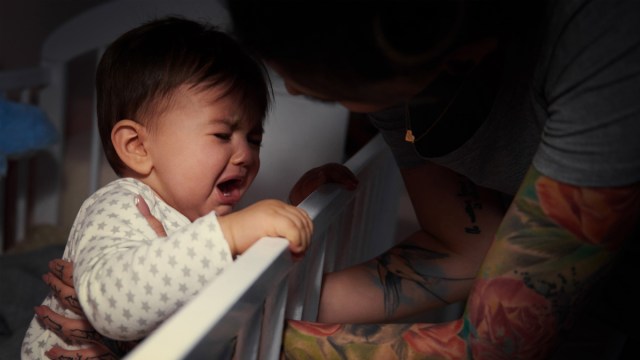With the average toddler taking 2,400 steps per hour and forming 1 million neural connections per second, it’s no wonder they need a good night’s sleep! So when you hear your kid wailing in the night after having a toddler nightmare, it’s equal parts frustrating and heartbreaking.
While your munchkin may be a bit dozy the next day and you may be worried about why this is happening, nightmares in toddlers and young children are actually developmentally appropriate. “Nightmares every now and then in childhood are normal,” says Dr. Binal Kancherla, a pediatric sleep specialist and medical director of the Children’s Sleep Center at Texas Children’s Hospital. Here’s what we know about toddler nightmares and how parents should handle them when they happen.
Can toddlers have nightmares?
Yes. While nightmares are most common in children six years and older, they can begin around the age of two—though Kancherla says they can be tricky to identify in younger children with limited communication skills. Most kids outgrow regular nightmares by the age of 12.
Nightmare vs. night terror: How are they different?
Since toddlers may not be able to talk about their experience, you can figure out which it is based on a few key differences between nightmares and night terrors: when they occur in the night and how severe they are. Nightmares take place in the second half of the night, during REM sleep, which is the fourth and final stage of the sleep cycle and one of the lighter stages. Night terrors generally happen just a few hours after kids fall asleep while they’re in the third and deepest stage, called slow-wave sleep.
When your kid starts screaming in the night, if it’s a nightmare they’ll look to be comforted by you and may need some soothing to fall back asleep. They’ll remember the incident in the morning. With a night terror, it will seem like your kid is awake but they’ll be inconsolable and won’t respond to your presence. They’ll usually crash as soon as the episode is over and won’t remember it the next day.
What causes toddler nightmares?
Unlike night terrors, nightmares aren’t usually triggered by sleep deprivation, nor are they caused by specific foods or melatonin use, though fevers and certain medications can bring them on. As your little’s sleep cycle evolves, they spend more time in lighter “dream” sleep, which can open the door to nightmares. Most of the time, they are rooted in “normal age-appropriate fears and anxiety,” Kancherla says. This can mean more nightmares at times of stressful change, like when a new sibling joins the fold or if your toddler changes daycares.
But she cautions that nightmares can also signal a mental health issue, like an anxiety disorder or trauma, so if children are old enough to express what’s worrying them parents should speak with them about it. “It’s normal for kids to be scared of monsters or boogie men or something they saw on TV or that a friend told them about,” she says. “What’s not normal is being afraid that someone’s going to break into your house and shoot you.”
Are nightmares bad for kids?
Nightmares aren’t harmful in themselves—they’re often our way of working through and making sense of things that happened during the day. But if a toddler or child has regular or recurrent nightmares for more than three months, or if they persist into the teen years, it’s a good idea to consult your pediatrician as it could be a condition like nightmare disorder or anxiety disorder.
What do I do when my toddler has a nightmare?
Reassure them
When your little wakes up crying after a nightmare, offer them plenty of comfort and TLC and help them fall back asleep again in their own bed. Validate their feelings without focussing too much on the actual nightmare and gently remind them that the dream was not real, as young children struggle to discern real life from dreams and imagination. If they’re old enough, you can talk about the nightmare and further reassure them the next day.
Better bedtime
There’s no magical bedtime trick for preventing nightmares, but a peaceful and positive bedtime routine can help settle children who start to anticipate bad dreams, so ditch the screens before bed and lean into calming activities like having a relaxing bath and reading books. Likewise, good sleep habits can help kids feel their best during the daytime and better manage stress and anxiety (toddlers require around 11 to 14 hours of sleep per night, per the Sleep Foundation).
Help them feel less scared
When toddlers’ imaginations start to explode, things like monsters or the dark can be the source of anxiety, so you can offer a nightlight or a new stuffie to help reassure them. A study of kids affected by the 2006 Israel-Lebanon war found that giving a Huggy-Puppy doll to some of the children significantly reduced their stress reactions, including nightmares. If they mention anything in their room that frightens them, like a large stuffie or an object that casts a creepy shadow, move them to another room in the house.
Talk to your doctor
If your toddler’s nightmares are frequent or very focused on the same specific fear, or if they seem to be dealing with anxiety throughout the day in addition to nighttime dreams, it’s a good idea to discuss them with your pediatrician. If needed, treatments like Cognitive Behavioural Therapy can help kids with anxiety and sleep specialists can check for other sleep disorders.
Generally, nightmares are a typical part of childhood that usually resolve on their own, so offer all the comfort and know that this too shall pass.











